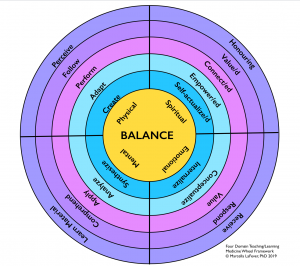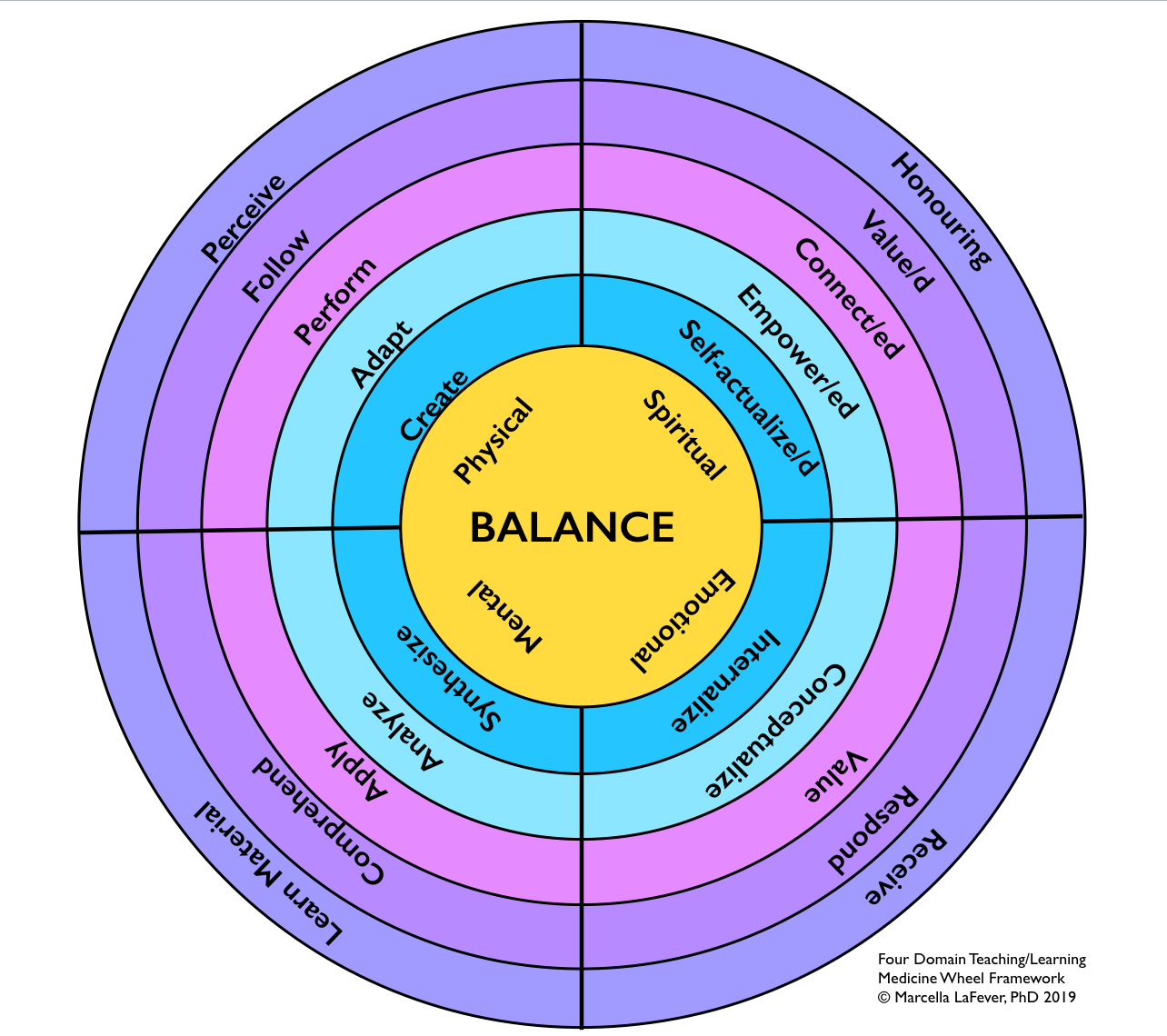 Thank you to former UFV student Charlene Leon* for inspiring me to investigate the use of the place of the Medicine Wheel in the scholarship of teaching and learning. I have been working on this project for four years and this month, on November 13, I am presenting a four domain model at the Symposium on Scholarly Inquiry into Teaching & Learning Practice in Vancouver, BC. This model is meant to assist curriculum designers to develop course outcome statements that honour learning needs across the physical, emotional, mental and spiritual and to support the efforts to Indigenize the Academy; making post-secondary education more culturally inclusive.
Thank you to former UFV student Charlene Leon* for inspiring me to investigate the use of the place of the Medicine Wheel in the scholarship of teaching and learning. I have been working on this project for four years and this month, on November 13, I am presenting a four domain model at the Symposium on Scholarly Inquiry into Teaching & Learning Practice in Vancouver, BC. This model is meant to assist curriculum designers to develop course outcome statements that honour learning needs across the physical, emotional, mental and spiritual and to support the efforts to Indigenize the Academy; making post-secondary education more culturally inclusive.
The framework expands the three domains of learning, pioneered by Bloom (1956) to a four domain construction based on the four quadrants of the Medicine Wheel (Bopp, Bopp, Brown & Lane, 1984), a teaching/learning framework that has widespread use in the indigenous communities of North America (Native American, First Nation, Metis, Inuit, etc). This model expands on the cognitive (mental), psychomotor (physical), and affective (emotional) domains to add the fourth quadrant, spiritual, as being essential for balance in curricular design that supports students in their learning goals. The description of the spiritual quadrant includes a progression of learning outcomes and suggested verbs for developing learning outcome statements.
The basic idea of the learning domain as pioneered by Bloom is that the learner builds from a foundation of knowledge or skills to higher order processes. For example, in the cognitive or knowledge domain, moving from recall to comprehension to applying the knowledge, analyzing the result, and then creating something new based on that analysis.
In the affective (emotion) domain, the one most closely related to spiritual perhaps, the progression goes from receiving stimuli, to responding to the stimuli, to valuing the experience, to internalizing the values and beliefs and behaving in a way that expresses that belief and value system. It is possible to argue that the affective domain includes emotional and spiritual, especially in light of the inclusion a value and belief systems. However, even if this were the case the spiritual is certainly not balanced with physical, mental, and emotional as it is in the four domain configuration of the medicine wheel.
Mindfulness: conscious or aware of learning that is not based in material or physical things, and transcends narrow self-interest;
Value/d: honouring the importance, worth, or usefulness of qualities that are related to the welfare of the human spirit;
Connect/ed: link, build and sustain positive relationship with someone or something (ie. community, culture, etc);
Empower/ed: provide and feel supported by an environment that encourages strength and confidence, especially in controlling one’s life and claiming one’s rights;
Self-Actualize/d: ability as a unique entity in the group to become what one is meant to be.
As in the literature on the three learning domains, I offer some possibilities for sample verbs that can assist curriculum designers in creating outcome statements that will help in realizing success in including spiritual outcomes in lesson plans. The samples are meant to bring out the intent of each step in the progression of spiritual growth and maturation, but are not not meant to be definitive or to exclude other possibilities. For example outcome come statements in a group communication course that works across the progression might go something like this: a) Be aware of the emotional needs of other group members; b) Acknowledge that others feelings and desires are as important as your own; c) Work with group members to create an atmosphere that supports everyone’s input to a project; d) Advocate for group members when you see that they are not being heard; e) Remain committed to the completion of your group’s project.
Bloom, B.S. (Ed.). (1956).Taxonomy of educational objectives handbook I: Cognitive domain.
New York: David McKay.
Bopp, J, Bopp, M., Brown, L. & Lane, P. (1984) The sacred tree: Reflections on Native American spirituality. Twin Lakes, WI: Lotus Light.
*Charlene Leon is a community helper, educator, activist, mother and grandmother and resides in British Columbia. She is Anishinaabe kwe and comes from the Peguis First Nation in Manitoba. She received her BA Adult Education degree at University of the Fraser Valley, BC in 2010. She recently received her Master in Social Work at Wilfrid Laurier University in Ontario, 2013. She has committed her life to truth and reconciliation of herself, her family and communities in the healing and recovery from colonial trauma and the aftermath and impacts of the Indian Residential School system. She is a first-generation survivor of the Indian Residential School system where her mother and grandmother attended in Manitoba for several years. Leon has worked with several Indigenous organizations over the past 25 years, both on and off reserve in the field of social service, education and in the private sector. She strives to incorporate Indigenous tradition and wholistic healing approaches and the application of this knowledge with diverse and generalist practice contexts.
*****************************
Dr. Marcella LaFever (University of New Mexico, 2005) is an Associate Professor in the Communications Department at the University of the Fraser Valley. She specializes in intercultural communication and brings that expertise to various subjects such as communication for workplace, instruction, social media, team and public speaking contexts.

